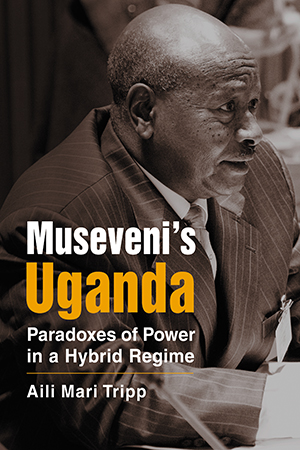
- 2010/223 pages
- Challenge and Change in African Politics
Museveni's Uganda:
Paradoxes of Power in a Hybrid Regime
Hardcover: $68.00
ISBN: 978-1-58826-731-3
Paperback: $28.50
ISBN: 978-1-58826-707-8
Ebook: $28.50
ISBN: 978-1-62637-628-1
Aili Mari Tripp takes a close, clear-sighted look at Ugandan politics since 1986, when Yoweri Museveni became the country's president.
Museveni's exercise of power has been replete with contradictions: steps toward political liberalization have been controlled in ways that further centralize authority; and despite claims of relative peace and stability, Uganda has been plagued by two decades of brutal civil conflict. Exploring these paradoxes, Tripp focuses on the complex connections among Museveni's economic and political reforms, his wars in the north and in Congo, the key roles of international donors and the military, and the institutional changes that have defined his presidency. She highlights, as well, efforts by the judiciary, the legislature, the media, and civil society to check executive power.
This is also a book about the semiauthoritarian regimes, like Uganda's, that characterize so many political systems in Africa. Tripp reflects analytically on the distinctiveness of this type of system—and on its implications for civil society, institutional growth, and real economic development.
Museveni's exercise of power has been replete with contradictions: steps toward political liberalization have been controlled in ways that further centralize authority; and despite claims of relative peace and stability, Uganda has been plagued by two decades of brutal civil conflict. Exploring these paradoxes, Tripp focuses on the complex connections among Museveni's economic and political reforms, his wars in the north and in Congo, the key roles of international donors and the military, and the institutional changes that have defined his presidency. She highlights, as well, efforts by the judiciary, the legislature, the media, and civil society to check executive power.
This is also a book about the semiauthoritarian regimes, like Uganda's, that characterize so many political systems in Africa. Tripp reflects analytically on the distinctiveness of this type of system—and on its implications for civil society, institutional growth, and real economic development.







